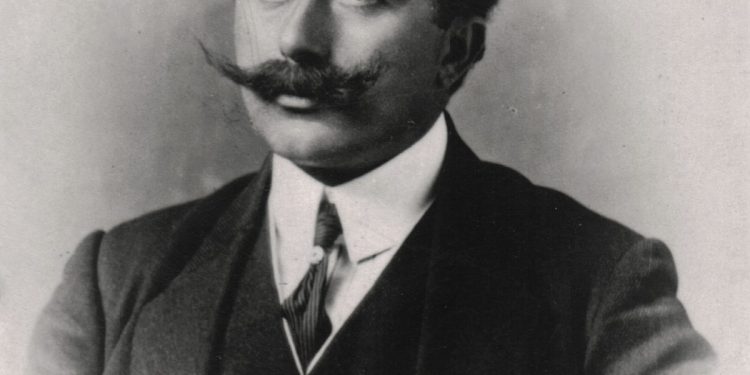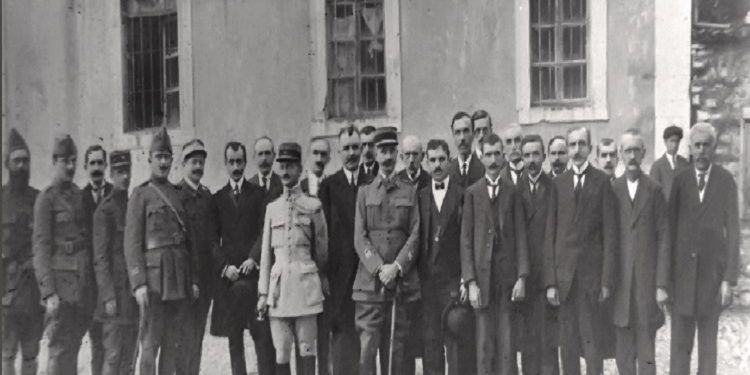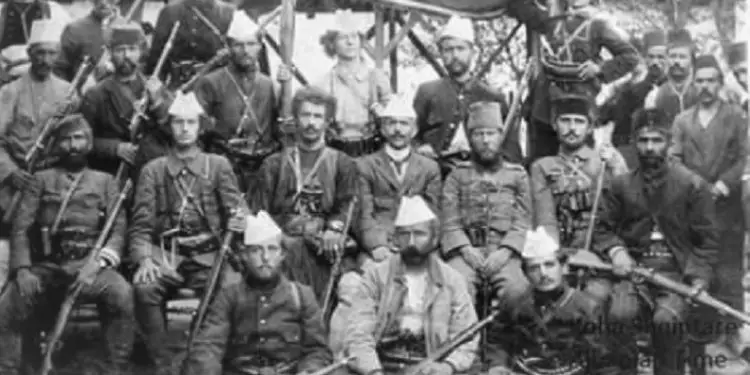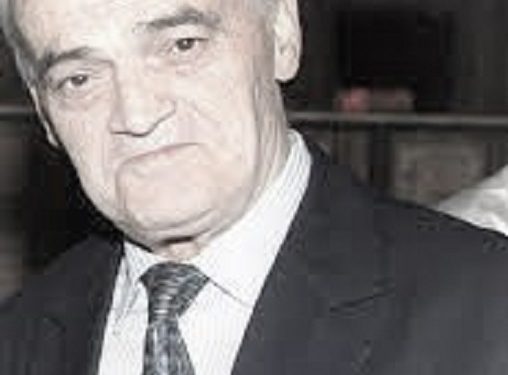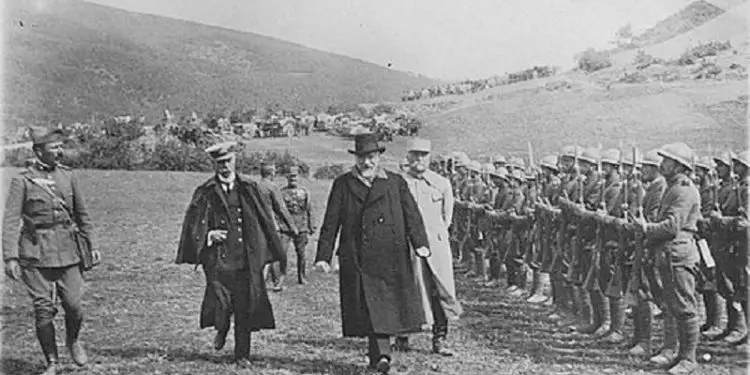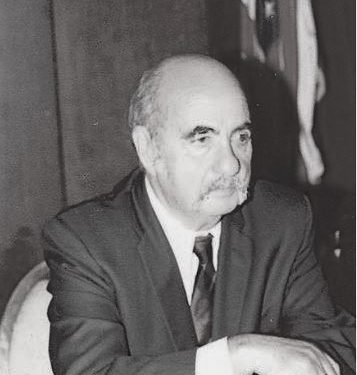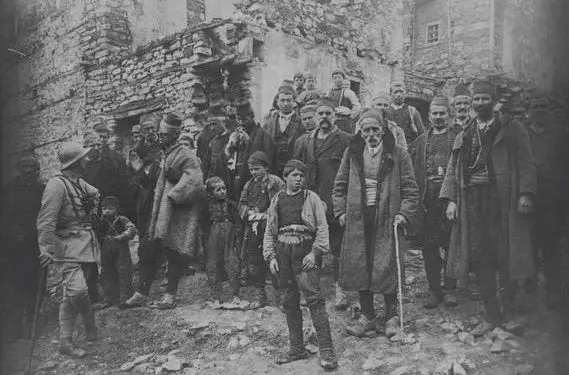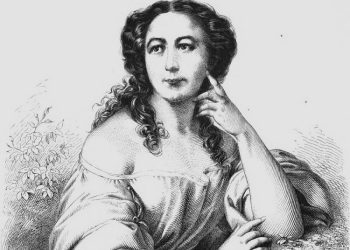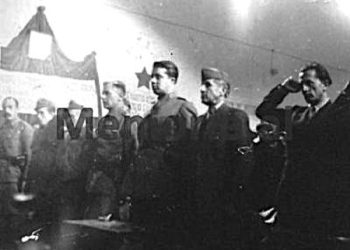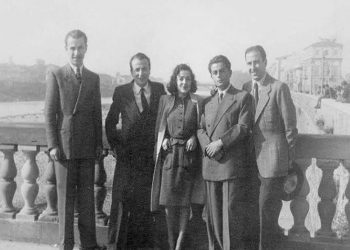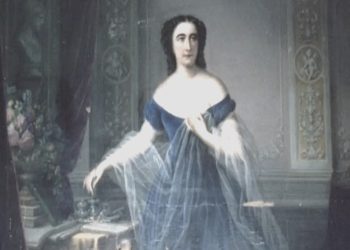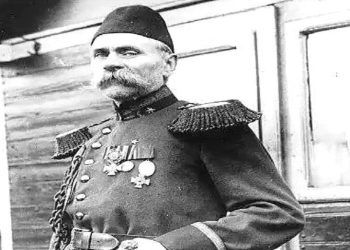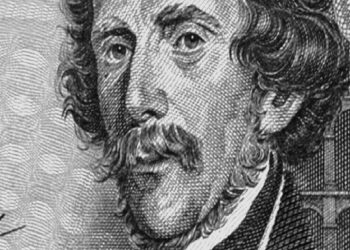By Idriz Lamaj
Memorie.al / Vasil Gërmenji, derives from a door of patriotic tradition. His grandfather, Thanas Gërmenji, often traveled to Istanbul and Misir, where he met with prominent patriots and activists of the National Movement, such as Naim Frashëri, Thimi Mitko, Spiro Dinen, and many others. Thanasi had a close friendship with Jani Vreto, whom he supported materially for the publication of his first writings. He kept in touch with various emigrants in the Albanian colonies of Bucharest, Sofia, Istanbul and Egypt and at the same time served as a liaison with their relatives in the homeland, sending them news and money from exile, thus playing the role of a banker small. Thanas Gërmenji was one of the founders of the underground movement “Dora e Zeze”. He was killed somewhere in Thrace, leaving behind three sons, Spyro, Themistocles and Telemachus, who remained not only orphans but also in a very difficult economic situation.
Door of national tradition
In 1892, the sons of Thanas Germenji immigrated to Romania. There they perform heavy physical work, as apprentices, and at the same time, they participate in all the activities of the national associations in the Romanian capital. After nine years, Telemachus and Themistocles return to Korça and, after many vicissitudes, settle in Manastir.
At that time, Manastir was one of the largest cities in the Balkans, where various political and cultural activities took place. There, was Vali of Istanbul. Many Albanian and foreign organizations, especially Greek and Bulgarian, also developed their activities in that city. Thanks to their patriotic father and the friendships he had, the mayor gave them a contract to supply the city with gas. By means of that enterprise, the Gërmenji brothers ensured their family livelihood and at the same time covered their national activities.
At the beginning of 1908, Telemak and Themistokli Gërmenji, opened a hotel in the center of the city and named it “Liberty”, which very soon became the center of the Albanians of Manastir and all those who went there. The hotel, apart from sleeping rooms, had a restaurant, a large conference room and a library that everyone could use. In a secret room, there was the national press: books, newspapers and magazines printed in the Albanian language, in Sofia, Bucharest, Boston and elsewhere.
Telemachus and Themistocles Gërmenji, in order to serve the nation, never stopped their patriotic activity from Korça, which has long been the cradle of all those societies and national patriotic activities. Themistokli Gërmenji, played the main role in the signing of the Albanian-French protocol, on December 10, 1916, for the declaration of the Autonomous Province of Korça, known as the “Republic of Korça”, and in the expulsion from there of the Greek invaders and their administration. But the “friendship” of the French military authorities with Themistocles would not last long.
When the French government began to take the side of the Greeks, the French general, Salle, in a conversation he had with Themistocles Germenji, asked him, among other things, about the opening of Greek schools in Korça. Themistocles answered the general bluntly: “The Albanian government will never allow the opening of Greek schools in Korça.” This staunch patriotic attitude of Themistocles and other patriotic corsairs like him was well known by the French military authorities. Now, they were no longer interested in the autonomous province of Korca. Not only that but, in order to satisfy Greek chauvinism, by order of the French government, Themistoklis Gërmenji was arrested and executed in Thessaloniki on November 9, 1917.
According to the historian Athanas Gegaj, Themstoklius, when he was about to be executed, did not allow his eyes to be closed, as is usual in these cases. Moreover, when they put him in front of the firing squad, he himself ordered in French, in a loud voice: “Feu” “Fire”! While I was putting this simple writing on paper, just to remember the anniversary of Vasil Germenji’s death, my close friend, Beytullah Destani, sent me from London this touching letter, unknown until now, which coincides with the date of execution of Themistocles Digger, which he sent to his mistress:
“My dear Evdhoksi,
I fell a martyr of the blasphemy. Since I will not return to Korçë and I am no longer at home, you have the right to marry, but for your marriage, consult with Pandelia e Tsali, who has the duty, as a patriot, not to let you suffer. He kisses his mother’s hand. I kiss Vasili and Efça’s eyes longingly. Know that, die innocent. I ask for forgiveness from all my countrymen, if I have done something bad without meaning to.
Long live Albania under the protection of France.
Your friend, Themistocles Germenji,
Thessaloniki, 9.11.1917. Address Evdhoksi Th. Gërmenji, in Korçë, Albania”.
Telemak Germenji, Vasili’s father, was killed three years before Themistocles, in 1914, together with Mendu Zavalan, near Pogradec. At that time, the beylers of Starova were blamed for his murder. Telemachus was considered the mastermind, political strategist and organizer of the popular anti-Turkish uprisings. The well-known Korça novelist, Bendo Shapërdani, (Vasil Alarupi), whose writings have been highly appreciated by Noli, writes about Telemak Gërmenjin:
“…With the wisdom of Telemachus and the bravery of Themistocles, large bands of warriors were formed to win the freedom of the homeland. These detachments became more famous and so threatening because of the bravery of those fighting boys, indeed, the traditional bravery of the Albanian. They tried it, marking one of the most daring episodes, when he committed the murder of the commander of the Ottoman suvarinjas, Rexhep Pasha. The murder was done inside Korça, by the entire squad that descended on the city and was led by Themistoklius, who had Vasil Tromara by his side…”! (“Free Albanian”, February 1971, pg.3).
Vasili was born in Manastir and grew up an orphan.
Vasil Gërmenji was born in Manastir on March 12, 1908, precisely in the “Liria” hotel, which, as we said above, was the property of the Gërmenji brothers. With the murder of his father, he was left an orphan at the age of six. The mother was from Greek parents and, apparently, they forced her daughter to separate from the Gërmenji family. Vasili grew up in his uncle’s family and, after his murder, lived with Teto, as he called her, Themistokoli’s wife, Evdoksina.
Vasili grew up and was educated in Korça, where he also completed the well-known Lyceum of that city. He completed his higher studies in Railway Engineering in Marseille, France. During his studies, he met Geramaine, whom he married, before returning to Albania, in 1934. Since Albania at that time had no railways, he was appointed a professor at the Technical School in Tirana, while his wife, a professor of French, at the “Mother Mretënshë” Institute. Spouses Gërmenji soon became very popular in the Albanian capital.
In 1935, with the coming into force of the government headed by Mehdi Frashëri, it seemed that in Albania, a kind of freedom was appearing in the elections that would be held for deputies. Vasili thought to use the opportunity and put his candidacy in the prefecture of Korça. But this initiative of his lasted only two weeks. The local authorities called him and told him that; “if he wanted to keep his candidacy, he had to give up his position as a professor at the Technical School”. He understood the game that was being played in that election as well and withdrew from any kind of political activity. Two or three weeks before the invasion of Albania by Italy, Vasili said goodbye to his homeland, never to return to it. He resides in Marseille, France.
During the Second World War, the economic situation, especially for the countries involved in the war, became very difficult. People suffered even for a morsel of bread. To make ends meet, Vasili and his wife opened a small shoe repair shop, in other words, he works as a shoemaker. With that simple job, he manages not only to live a normal life, but also to help many friends. Vasili was known for his generosity. After the occupation of southern France by German forces, he joins the French Military Front, (“National Resistance”), which was headed by Francois Mitterand, who, when Basil died, was the president of France. At the end of the War, he was awarded the “Cross of Merit” First Class and was officially recognized as a veteran of the French National Liberation. After the war, he continued working in the shoe store.
Freelance journalist in exile
Like any other historical period, also that of the long Albanian political emigration, after the Second World War, belongs to outstanding and special events and personalities. With the formation of the “Free Albania” Committee, in 1949, apart from the well-known political and nationalist figures, who had left Albania, leaving behind their families, relatives and the people in general, in a terrible state of persecution, torture, of executions, internments and imprisonments, Vasil Gërmenji also stands out, who, with the all-round activity he developed, joined the anti-communist political campaign.
After the end of the War, Vasil was immediately approached by his former “comrades” proposing to return to Albania and cooperate with the new communist regime, even offering him high positions in the government. It is worth emphasizing the fact that Vasili had known Enver Hoxha personally for a long time. There was even some friendship with him, both in Korça and in France. According to Vasili, Enveri, at the time he knew him, had no communist feelings or aspirations. Vasili connected the fanaticism of Enver Hoxha, as a communist and dictator, from the moment of his fall, under the control of Serbian-Montenegro agents.
Regarding the invitation given to Vasili to return to Albania, which he rejected with contempt, Dr. Ramazan Shpati introduces us to a conversation between Vasili and Behar Shtylla, in Paris, in 1947. His open conflict with Behar started over the Kosovo issue. When Vasili had asked Mr. Shtylla, regarding the problem of Kosovo, he answered: “We have enough in Albania, one million ignorant people (then it was said that Albania had one million inhabitants), without adding another four or five hundred thousand”. Vasili couldn’t take it anymore and slapped him in the face: “You will pay dearly for this high national betrayal”! – And had left without saying goodbye to him, although he had known him for a long time. Immediately, after this rejection, he was intensively engaged in the fierce political campaign against Enver Hoxha’s regime.
It attracts and gathers around itself, uncomplicated immigrants in political parties. As an independent, he prepares, publishes and distributes, for four years, 1950-1954, the monthly newsletter: “I mërguemi”, which, after a few issues, he turns into the bilingual newspaper, Albanian and French, “Liri e Kombit”. In this newspaper, he dealt in detail not only with internal developments in Albania, but also in other communist regimes, in general.
In his comments and analyses, he stands out as a determined social democrat and calls for the unification of all nationalist forces in a common campaign against the communist regime. He also accuses the communist regime of Tirana; also for high national treason, related to the issue of Kosovo. During his entire patriotic-diplomatic activity, he never separated the problem of Kosovo from the cause of national unification. In his press, as in no other emigration press, he closely follows all internal developments in Yugoslavia.
In his political campaign, against the communist regime in Albania, he comes out with a clear political program. The newsletter “I mërguemi” and the newspaper “Liri e Kombit” are living proof of his all-round efforts to liberate the homeland from the communist regime and the realization of ethnic democratic Albania. His controversies in the press are constructive in the full sense of the word. He appeals to the political groups in exile, not to fight with each other, for their party views, but to concentrate, on a common platform, simply for the Albanian issue.
In the article “Slogans”, published in “Liri e Kombit” 60 years ago, he wrote: “We don’t like slogans. Especially those that promise death, cutting, hanging, murder and change, to whomever…! Today in Tirana, where a hated criminal dictatorship reigns, not a newspaper is published, not a letter is written, not even a private postcard is written, without the slogan at the top; “Death to Fascism – Freedom to the People”…! However, despite their slogan, “Freedom to the People” they did not give. They gave him neither bread nor clothes…! They put the people into compulsory labor…!
Even if they build magnificent and gigantic works of art and technology, and which may remain for a long time, they will remind us of the great works, which remain even today, that the pharaohs of ancient Egypt did with slaves… ! Enough dictatorships and dictators…! Let’s work wisely to remove the current dictatorship of Tirana and replace it with a real democracy. “The pan is soft and full…”, we say in Korça and elsewhere”.
If you carefully study his writings during the four years, especially the articles in French, it is clear that he was a deep connoisseur of the internal problems of the Albanian communist state, of the concerns of the Albanian nationalist diaspora, or of the deep gap between Soviet communism and Western democracies.
Member of the “Free Albania” Committee
On August 26, 1949, the National Committee “Free Albania” was announced in Paris, under the chairmanship of Mit’hat Frashëri. Various Western newspapers wrote about the establishment of that Committee. The newspaper: “The Christian Science Monitor”, of August 26, 1949, made this announcement: “…its goal will be the representation of all Albanian layers, who want the establishment of a government that respects the rights and freedom of own citizens…! In this Committee, prominent Albanian personalities are included, in the social and political sphere, and it will have its headquarters in New York…”! In fact, contrary to what the above newspaper writes, only some of the nationalist political currents of exile were represented in that committee. The political groups that were left out of representation in the Committee immediately began their serious reaction.
Vasil Gërmenji, not committed to any political grouping, without delay, at the beginning of 1950, through the newsletter “I merguemi”, supports the idea of a wider involvement in this committee. The fact that the Committee had its headquarters in New York, although he was not yet a member, he values as something important and hopeful. After the reformation of the “Free Albania” National Committee, when Hasan Dosti took over its leadership, Vasil Gërmenji was appointed a member of this committee. Regardless of this, he does not engage so much in his activities, simply because of what he described as; “a gathering of dangerous people and intrigues, for the Albanian issue”. Apparently, he had smelled the infiltration in the ranks of the members of the Committee, the Albanian State Security and the Yugoslav UDB.
In 1956, when Dr. was appointed at the head of this committee. Rexhep Krasniqi, Vasil Gërmenji, was the first member who was invited to participate in it, an invitation that he immediately accepted. After quickly arranging the travel documents, he immigrated to the USA and served with exceptional competence in every field of the Committee’s activity.
For the close fraternal cooperation between Krasniqi and Germenji, just out of curiosity, I am bringing the reader some strange coincidences! Both were born outside the territory of the Albanian political state, Vasili in Manastir e, Rexhepi in Gjakovë. They had grown up orphaned and in extreme poverty, one by Themistokli Gërmenji’s wife and the other by Bajram Curri’s wife, in two different cities: Vasili in Manastir and Korçë, the other in Gjakova and Shkodër. Although with different school preparation, Vasili with French culture and Rexhepi, German, united in all Albanian nationalist ideals.
They had the same opinion about the communist regime in Albania, considering it simply a tool of Slavic interests, and as such, it had to be fought mercilessly and in every way. Both, although they supported and respected the Albanian political parties in exile, had reserved attitudes towards them. For them, every Albanian issue should be seen above personal and party interest. All this did not prevent them from being completely independent in their personality: prof. The most conservative Krasniqi, ing. More liberal dig.
Prominent diplomat in the political crusade against communism, president of the Assembly of the ‘Captive European Nations’.
“…At the plenary meeting of the Assembly of Captive European Nations, (Assembly of Captive European Nations, – ACEN), held on September 15, 1970, in New York, the member of the “Free Albania” Committee and its permanent representative, near this organization, Ing. Vasil Gërmenji was elected chairman for the second time. This was an honor given in exile to our so-suffering Albania, recognition of the first contribution that the “Free Albania” Committee had made to the Assembly, since its inception, and at the same time a high personal appreciation of Mr. Vasil Gërmenji, from his ACEN colleagues. “If it can be assumed that his first election was a sign of courtesy to a member organization, the second election should be considered without a doubt as a sign of the prestige enjoyed by Mr. Gërmenji, among his colleagues in ACEN”, wrote, among others, the newspaper, “Sxhiptari i lire” (September-October 1970, pg. 1), organ of the “Free Albania” Committee.
What was ACEN, the Assembly of Enslaved European Nations? This was the largest and most powerful anti-communist organization in the world, supported morally and materially by the US government. Since its establishment, in 1954, when it took the place of the “Free Europe” Committee, ACEN continued its activity almost until the fall of the communist regimes in the Eastern European countries. The Executive Assembly or Assembly of this organization consisted of representatives of; Albania, Bulgaria, Czechoslovakia, Hungary, Estonia, Latvia, Lithuania, Poland and Romania. These nine states of Eastern and Central Europe, which had been free and sovereign before 1939, was full members of ACEN and each of them, had the right to one vote.
Several international organizations also took part there, without the right to vote, such as; “Agrarian International”, “Christian Democratic Union of Central Europe”, “Center of Free Trade Unions in Exile”, etc. The center of the Assembly was in New York, in a building near the American Mission, near the United Nations. ACEN also had offices in Washington, D.C. The well-known newspaper “The New York Times” has evaluated ACEN as a small UN. He had permanent representation in; Argentina, Australia, Brazil, Canada, France, Germany, England, Italy, Sweden, Denmark, Colombia, Ecuador, Greece, India, Japan, Lebanon, Mexico, Philippines and Switzerland.
ACEN carried out its activities through these bodies: the General Committee, an executive body that managed the services of the organization during the year; The working committee, the political and legal committee, the economic and social committee, the cultural and informative committee and the Secretariat, with the relevant press and accounting office. This powerful anti-communist organization was made up of well-known and prominent personalities of the respective countries, such as statesmen, diplomats, soldiers, etc., who had enjoyed popularity in their countries, both during the War and after the coming to power of the communist regimes. .
Among them we can mention: Ferenc Nagy, former prime minister of Hungary; Constandin Visoianu, former Foreign Minister of Romania; Stefan Korbonski, former leader of the insurgent movement against the German occupier in Poland and well-known writer; Dr. George Dimitrov, chairman of the Bulgarian committee and friend of Albania; Dr. Lettrih, former Slovak Prime Minister; Dr. Stefan Osuki, one of the founders of Czechoslovakia and other prominent figures, democratic patriots, who fought for the freedom of their people oppressed by communist regimes.
In October 1962, Vasil Gërmenji was elected vice-president of the International Federation of Free Journalists. The list of his interviews, speeches, scientific conferences, analyses, debates and various writings of a national and international character is long. During his career, he wrote hundreds of articles, analyzes and diplomatic reports. In the press of the time, his name is often mentioned for the role he played in various activities, or for the high-level meetings he had in Washington, with statesmen and diplomats from all over the world. As we pointed out before, in all these activities, he constantly raised the issue of Kosovo, protesting it energetically, against the Belgrade regime.
Last greeting
For Vasil Gërmenji, November 28 was the holiest day. Even after he retired in 1973, he insisted that; the commemoration of our National Holiday, by the “Free Albania” Committee, was organized as best and as dignified as possible. On the day of the Feast, from 10 o’clock in the morning, he called us at the office and asked us for the last details, as well as the phone number of the hotel hall, where the ceremony would take place. Although he sent a written greeting, he also made a telephone greeting in the hall to congratulate the attendees and thank the foreign guests for their attendance. In the last written greeting sent to Dr. Krasniqit, on November 19, 1988, wrote among other things:
“I regret that, for reasons of distance and health, I am not able to participate in the commemoration of the 76th Albanian National Holiday. Once again, we are commemorating and celebrating in exile, our nation’s holiest day. As we have done every year, since we fled our homeland, for various reasons, but more than anything, because we did not want to accept the occupation of our land by foreigners, nor did we want to we obey dictatorships inspired or imposed on our nation by foreigners or by foreign ideologies. We are convinced that, our compatriots in Albania and in our captive lands, always celebrate this remarkable day, and hope to enjoy a happy life, in peace with all the democratic freedoms that free people should have and for which our ancestors fought with blood”.
Meanwhile, he failed to make the phone call in the hotel room, where the “Free Albania” Committee was commemorating our National Holiday. That day, November 28, 1988, he closed his eyes forever, in a car accident, there from 12 o’clock in the day. His body was covered in blood, a scene reminiscent of the tragic end of both his own father and grandfather.
The news of the tragic death of Vasil Germenji and his wife came to us before the Flag Festival ceremony was over. Prof. Rexhep Krasniqi and Dr. Hamdi Oruçi, close friends of the Gërmenji family, left immediately for Florida. There, they arranged their funeral in a dignified manner at Inverness City Cemetery. The “Free Albania” committee received letters and telegrams of condolence from various personalities of ACEN, the American Foreign Ministry, etc. The next day, “Voice of America” broadcast an extended obituary of Gërmenji, where his activity in the service of the homeland was highlighted.
The main newspaper of the city of Inverness, in central Florida, published a summary of the political activity of Vasil Gërmenji, as a member of the “Free Albania” Committee, together with a photo of him in front of the US Congress building, in Washington, when he was delivered to Congressman Horton of New York a political memorandum on the condition of the Captive Nations of Europe from ACEN in 1969, when he was Chairman of said organization.
Painful silence for him…!
Vasil Gërmenji, heir to a well-known family of patriots, raised an orphan with suffering and extreme poverty; a practical and practical person in life; generous, loyal and outstanding patriot, today he rests in silence far from his homeland. His gadi name is not even known in his beloved Korça, let alone in his ethnic homeland, to which he devoted his life. I had the good fortune to meet Vasil Gërmenji and collaborate with him, for twenty years, since the first days of my arrival in the USA, in 1968, and the efforts to help prof. Nexhat Peškëpinë, in the preparation of the “Alxiptari i Lire” newspaper, until the day he closed his eyes, in the bloody car accident. Years after his death, I learned from Dr. Krasniqi, that Vasili had insisted, before Nexhati passed away, in 1970 that I join the “Free Albania” committee and deal with the problems of his press.
The return of Vasili’s bones to the homeland and the raising of a bust next to his uncle in Korca would honor Korca and the people of Korca. Naming a street or boulevard in Tirana after him would honor Albania and Albanians. It is a moral, patriotic and national obligation for the Albanians of Kosovo to honor Vasil Gërmenji, because the monastery of Korça was also the lord of Kosovo in the Palace of the United Nations Organization. Vasil Germenji’s colleagues, statesmen, diplomats and expatriate politicians of the Eastern European Nations, ruled by Soviet communism, have been erected memorials in the capitals of their countries. After 20 years of democracy in Albania, it is a terrible pain when you think that the national activity of Vasil Gërmenji is being given to his compatriots only through this simple writing. Memorie.al




